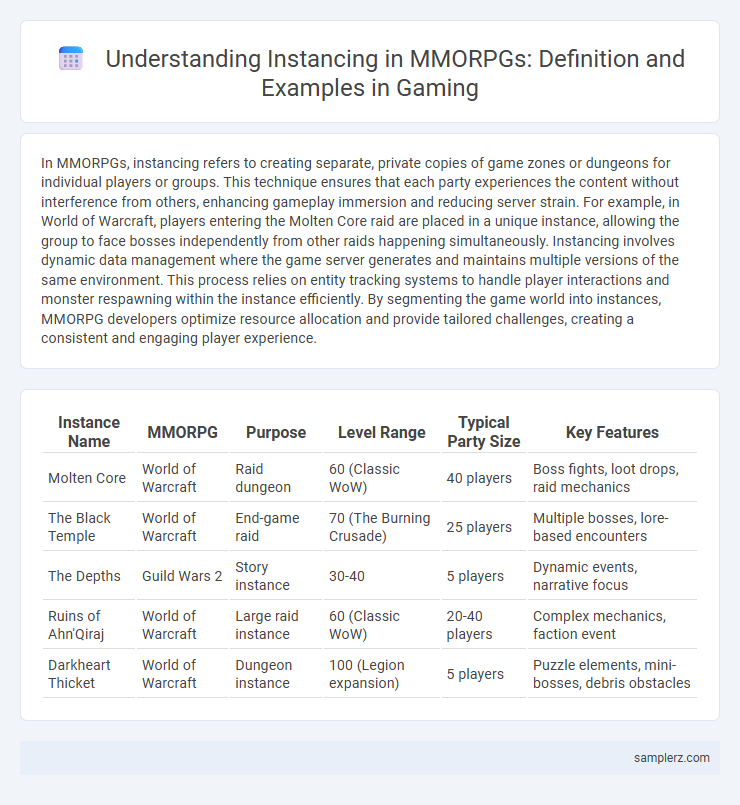In MMORPGs, instancing refers to creating separate, private copies of game zones or dungeons for individual players or groups. This technique ensures that each party experiences the content without interference from others, enhancing gameplay immersion and reducing server strain. For example, in World of Warcraft, players entering the Molten Core raid are placed in a unique instance, allowing the group to face bosses independently from other raids happening simultaneously. Instancing involves dynamic data management where the game server generates and maintains multiple versions of the same environment. This process relies on entity tracking systems to handle player interactions and monster respawning within the instance efficiently. By segmenting the game world into instances, MMORPG developers optimize resource allocation and provide tailored challenges, creating a consistent and engaging player experience.
Table of Comparison
| Instance Name | MMORPG | Purpose | Level Range | Typical Party Size | Key Features |
|---|---|---|---|---|---|
| Molten Core | World of Warcraft | Raid dungeon | 60 (Classic WoW) | 40 players | Boss fights, loot drops, raid mechanics |
| The Black Temple | World of Warcraft | End-game raid | 70 (The Burning Crusade) | 25 players | Multiple bosses, lore-based encounters |
| The Depths | Guild Wars 2 | Story instance | 30-40 | 5 players | Dynamic events, narrative focus |
| Ruins of Ahn'Qiraj | World of Warcraft | Large raid instance | 60 (Classic WoW) | 20-40 players | Complex mechanics, faction event |
| Darkheart Thicket | World of Warcraft | Dungeon instance | 100 (Legion expansion) | 5 players | Puzzle elements, mini-bosses, debris obstacles |
Classic Dungeon Instancing: Exploring World of Warcraft’s Model
Classic dungeon instancing in MMORPGs like World of Warcraft revolutionized group gameplay by creating separate copies of dungeon environments for different player parties. This approach minimizes player congestion and competition for resources, enhancing the cooperative experience while maintaining game balance. WoW's model leverages instanced zones to deliver tailored challenges and loot drops, optimizing both server performance and player engagement.
Raiding Instances: Cooperative Challenges in Final Fantasy XIV
Raiding instances in Final Fantasy XIV offer cooperative challenges where groups of players team up to defeat powerful bosses and complete complex objectives within a controlled dungeon environment. These instances provide a unique gameplay experience by limiting access to a select party, ensuring balanced encounters and strategic collaboration. Efficient communication and role coordination are essential for overcoming the mechanics and earning valuable rewards such as high-level gear and crafting materials.
PvP Battleground Instances: Competitive Spaces in Guild Wars 2
PvP battleground instances in Guild Wars 2 provide dedicated arenas where players participate in balanced, skill-based competitions separate from the open world. These instances include popular modes like Conquest and Stronghold, designed to ensure fair matchmaking and minimize external interference. By isolating participants, Guild Wars 2 offers a seamless, competitive PvP experience that emphasizes teamwork, strategy, and player-versus-player combat dynamics.
Story-Driven Instances: Personalized Quests in Star Wars: The Old Republic
Story-driven instances in Star Wars: The Old Republic offer personalized quests that adapt to individual player choices, enhancing immersion and narrative engagement. Each instance presents unique dialogues, challenges, and outcomes tailored to the player's faction and decisions, creating a dynamic storytelling experience. This approach exemplifies how MMORPGs utilize instancing to deliver customized, lore-rich adventures that deepen player connection to the game world.
Dynamic Event Instancing: Shared Versus Personal Progress in Elder Scrolls Online
Dynamic event instancing in Elder Scrolls Online balances shared and personal progress by creating separate instances of world events for individual players or groups. Shared instances allow multiple players to participate simultaneously in large-scale events, fostering cooperation and competition, while personal instances track individual contributions and rewards independently. This system enhances gameplay by providing personalized challenges alongside a communal experience, optimizing engagement and server performance.
Scaling Instances: Level-Adaptive Encounters in Lost Ark
Scaling instances in Lost Ark dynamically adjust enemy difficulty and rewards based on the player's level, ensuring balanced and engaging gameplay across diverse character progressions. This level-adaptive design maintains challenge and prevents power imbalances, enhancing cooperative experiences in dungeons and raids. By tailoring encounters to individual skill and gear, Lost Ark promotes sustained player interest and optimized progression in its MMORPG ecosystem.
Open World Instancing: Seamless Island Exploration in RuneScape
Open World Instancing in RuneScape allows players to explore Seamless Islands without interference from other users, ensuring personalized gameplay and quest progression. Each instance dynamically generates unique environments and NPC interactions, enhancing immersion and reducing competition for resources. This technique optimizes server performance while maintaining the expansive feel of the MMORPG world.
Private Housing Instances: Customizable Spaces in Black Desert Online
Private Housing Instances in Black Desert Online allow players to own and customize personal living spaces within the game world, providing a unique and immersive experience. These instances function independently from the shared game environment, ensuring privacy and exclusive access for the owner and invited friends. Customizable furniture, decorations, and layout options enhance player creativity, making private housing a popular feature among MMORPG enthusiasts seeking personalization and social interaction.
Seasonal Event Instancing: Limited-Time Content in Destiny 2
Seasonal Event Instancing in Destiny 2 offers players exclusive access to limited-time activities and rewards within private game environments, ensuring personalized experiences free from outside interference. These instances refresh with each season, delivering unique challenges, storylines, and loot tailored to the event's theme. This system boosts player engagement by providing fresh content while maintaining server stability and balanced matchmaking.
Boss Rush Instances: Group Coordination in Phantasy Star Online 2
Boss Rush Instances in Phantasy Star Online 2 require precise group coordination, where teams face sequential powerful bosses within limited time frames. Players optimize roles such as tanking, crowd control, and healing to manage mechanics and maximize damage output effectively. This instancing model enhances cooperative gameplay by emphasizing strategy, communication, and quick adaptation to dynamic boss patterns.

example of instancing in MMORPG Infographic
 samplerz.com
samplerz.com